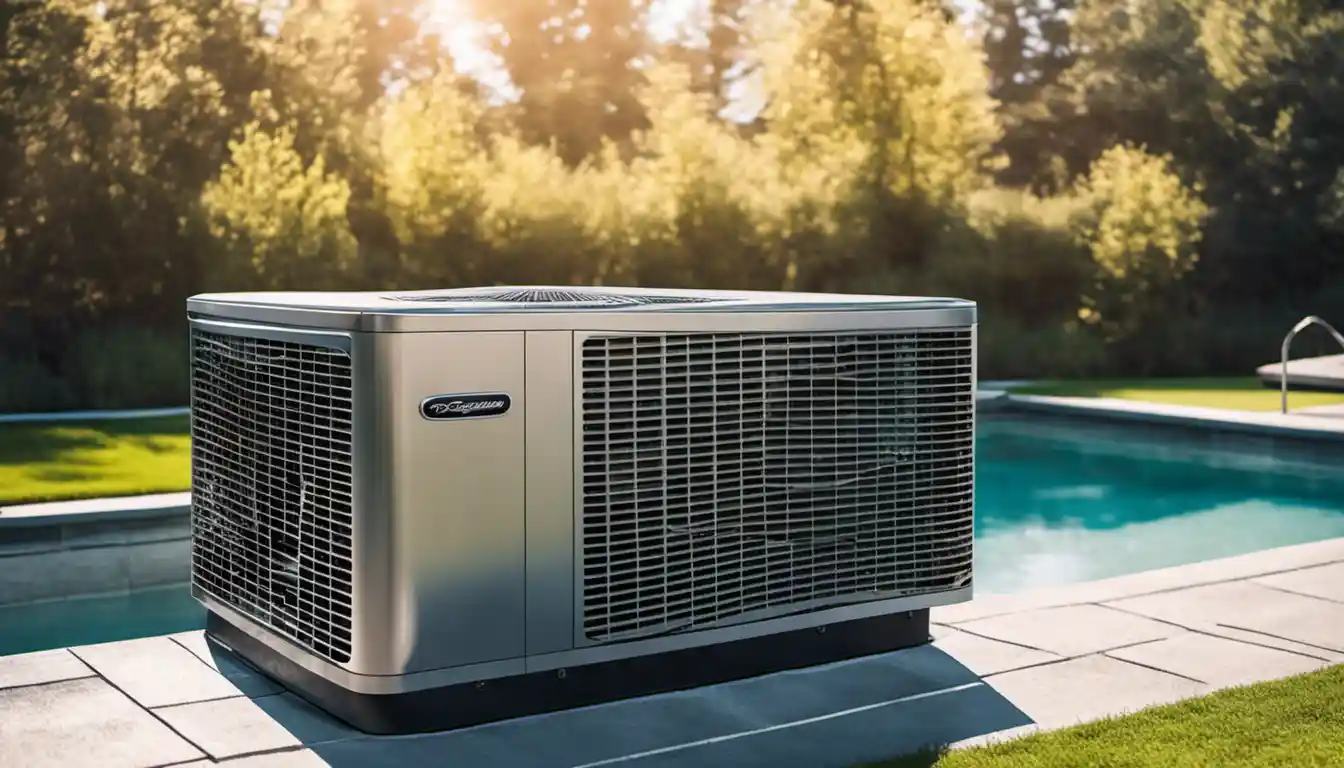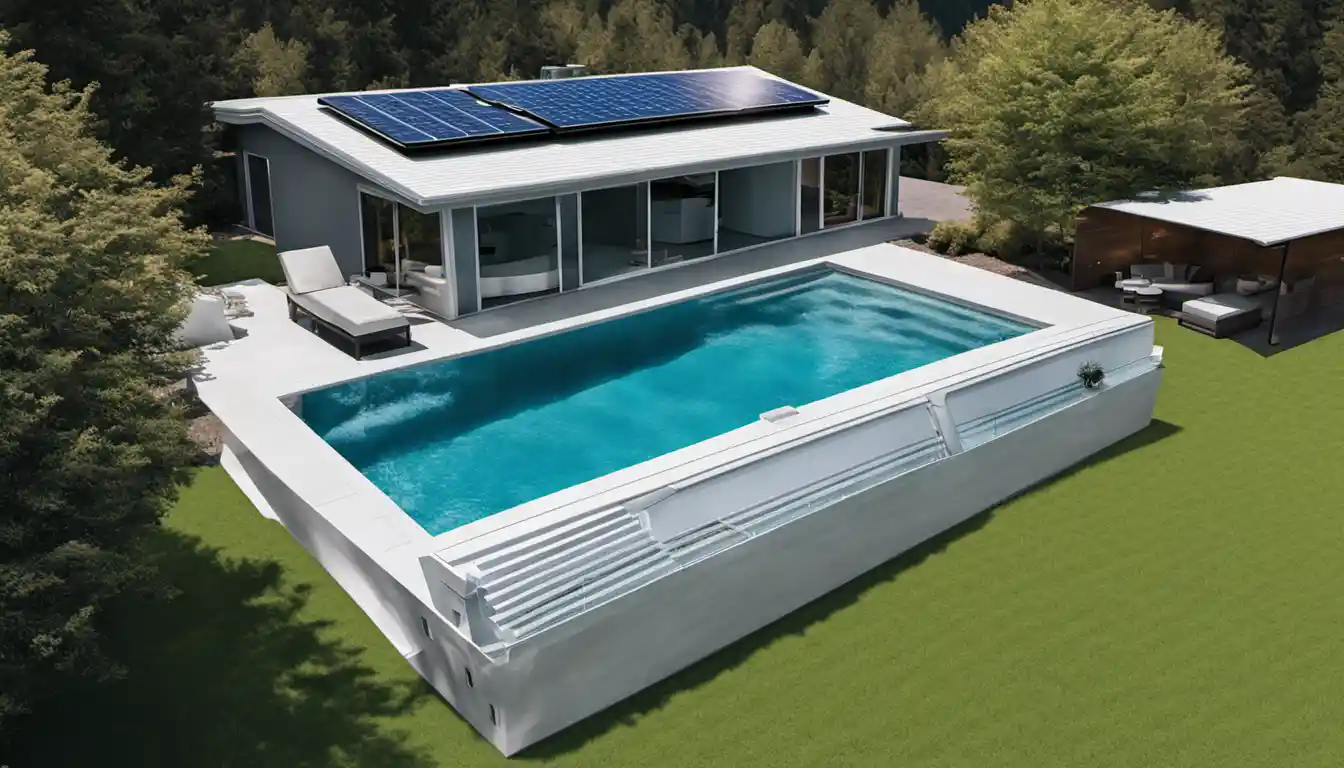Understanding Pool Heating Options
A pool heat pump uses electricity to capture heat and move it from one place to another, efficiently heating the pool. On the other hand, a solar pool heater uses solar panels to convert sunlight into heat, which is then transferred to the pool. Both systems have their pros and cons: pool heat pumps work consistently regardless of the weather but consume electric power; solar pool heaters are environmentally friendly and use free solar energy but their efficiency can vary with the amount of sunlight.
Introduction to Pool Heat Pumps
The pool heat pump, a marvel of modern swimming pool technology, works on the principle of heat transfer. Using electricity, it captures heat from the surrounding air and transfers it into your pool, keeping the water at a consistent temperature for countless hours of family fun.
How do swimming pool heat pumps work?
These devices operate by drawing in warm air from around the pump, using a fan. The heat captured is transferred to the pump’s refrigerant, which warms up as it absorbs the heat. As it travels through the pump’s compressor, the heat intensifies, and finally, it is transferred to the pool water that circulates through the heat exchanger. This process is repeated until the water reaches the desired temperature.
The science behind heat pumps
This carefully engineered process relies on the second law of thermodynamics, which states that heat will move from a hotter body to a colder one. In this case, our heat pump cleverly leverages this knowledge, capturing ambient heat present in the environment and channeling it into your pool.
Advantages and Disadvantages of Pool Heat Pumps
Heat pumps, due to their consistent performance, reliability, and cost-effectiveness, have become a popular choice for pool owners. They are efficient and work well in mild climates but their performance may be less impressive in colder climates.
What size heat pump do I need for my pool?
The size of the heat pump required depends on the size of your pool. A small heat pump will take too long to heat a large pool and may fail prematurely due to overwork. A large heat pump for a small pool might cost you more upfront and result in unnecessarily high energy consumption.
Are pool heat pumps worth it?
When considering pool heat pump vs solar, you may ask whether heat pumps are worth it. The answer lies in the kind of climate your place has. If it is milder, then pool heat pumps are highly efficient and may be worth their cost. However, if you live in a colder climate, a gas heater might suit you better.
How long does it take to heat a pool with a heat pump?
Heating the pool with a heat pump can take anywhere from 24 hours to 72 hours, depending on the size of your pool, outdoor temperature, and the desired water temperature.
What happens when the heat pump reaches the desired swimming temperature?

When the pool reaches the desired temperature, the heat pump switches to maintenance mode. It continues to operate, but at a reduced capacity, only running when necessary to maintain the set temperature.
What is the coldest temperature at which a heat pump can be operated?
The efficiency of a heat pump decreases as the outside temperature drops. It usually operates most effectively at temperatures above 50°F.
Introduction to Solar Pool Heaters
As an advocate of renewable energy myself, the topic of solar pool heaters always brings a smile to my face. Relying solely on the sun’s energy, these systems are the epitome of eco-friendly and cost-effective pool heating.
How do solar pool heaters work?
Solar pool heaters transfer heat from solar collectors – generally mounted on your roof – to your pool. As pool water is pumped through these collectors, it is heated by the sun before it is returned to the pool.
The science behind solar pool heaters
At heart of these heating systems are solar collectors – panels that absorb the sun’s heat. As water from your pool circulates through these heated panels, it warms up before returning to your pool.
Advantages and disadvantages of Solar Pool Heaters
The biggest advantage of solar pool heaters is that they use renewable, free solar energy, reducing your carbon footprint and utility bills. However, their performance is dependent on the amount of sunlight, making them less effective in cloudy weather or during the colder months.
Why are solar pool heaters so popular?
The appeal of solar pool heaters comes from their ability to harness the plentiful and free energy of the sun to deliver eco-friendly and cost-effective pool heating. For more insights into the journey of sunlight into your pool, check out our detailed guide on our “/solar-panel-for-pool” page.
Essential considerations for solar pool heaters
Here’s the catch: while solar pool heaters provide an amazing eco-friendly heating solution, the installation can be quite a hefty upfront investment and you may need a larger area to set up extra solar panels.
Comparing Pool Heat Pump and Solar Heating
While both systems serve the same purpose – heating your pool – their mechanics, installation costs, and operational efficiency vary significantly.
Heat Pumps and Solar Pool Heaters: The Main Differences

The primary difference between these two systems is the energy source – heat pumps rely on electric power to operate, while solar heaters utilize the sun’s rays. The operating costs associated with these are usually lower for solar heaters, but poor weather can affect their performance.
Cost Implications
When deciding on “pool heat pump vs solar”, cost indeed becomes the most pivotal factor.
How much does it cost to run a pool heat pump?
The variable cost of running a pool heat pump can vary between $50-$150 per month depending on the size of the pool, the pump’s efficiency, and the local cost of electricity. But this is still generally cheaper than gas heaters.
Cost Breakdown on Solar Pool Heaters
The true beauty of solar heaters is in their running cost, which is virtually ‘nil’. You’re simply harnessing the sun’s power, and that’s free! The real cost comes in the purchase and installation of this system, ranging from $3000-$4000 on average.
Cost comparison – heat pump vs. solar pool heaters
While a heat pump may have a lower startup cost, solar heaters win in the long run, given their negligible running costs. So, if you’re in for the ‘long soak’, as I’d like to say, solar is the way to go!
Installation Comparison
Heat pump installation
Installing a heat pump requires professional installation. It connects with your pool’s current pump system and requires a dedicated electrical line.
Solar pool heater installation
Installation of a solar pool heater likewise needs professional hands due to plumbing and solar panel placement dynamics. It’s also best to consult a solar expert to determine optimal positioning for the solar panels, something I have been doing for the past 20 years and still find rewarding.
Running Costs Comparison
The running cost is where solar pool heaters shine, utilizing free solar power. Heat pumps, while efficient, do link you to the cost of electricity.
Heat pump running costs

Heat pump running costs depends on local electricity rates. On average, this cost can be between $50 to $150 per month.
Solar pool heater running costs
The running cost for a solar pool heater involves maintaining the pump and the panels, a small fraction of the electric or gas heating costs.
Delving Deeper: Combination Systems and Optimizing Pool Heating
Benefits of Combining Both Together
Combining both systems can reap the most benefits, ensuring pool heating availability even during the twilight hours or on colder, cloudier days.
Effectiveness of using a pool cover
Whether it’s a pool heat pump or solar, one thing’s a must – a pool cover. It reduces evaporation, thus maintaining the pool’s warmth and reducing your heating requirement.
Optimizing on Your Pool Heating
Smart usage and maintenance can squeeze out the best performance from your heating systems, be they solar or pump-based.
Conclusion: Choosing between Pool Heat Pump and Solar Heating
While each has its own merits, the decisive factors are likely to be your financial capacity for upfront investment, the local weather patterns, and your personal stance towards environmental sustainability.
Factors to consider when choosing between heat pump and solar heating
A couple of factors come into play while choosing between the two: climate, upfront cost, running cost, and personal environmental concerns.
Final Verdict: Which option is better?
If affordability, consistency, and quick heating are your needs, a pool heat pump might be more suited. If the goal is long-term savings and you are keen on environmentally friendly options, a solar pool heater is the choice. In reality, the perfect pool heating solution may well be a mix of both options, optimized as per your needs. Happy soaking!



